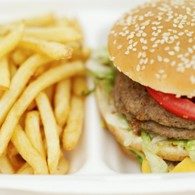- Calls to this hotline are currently being directed to Within Health, Fay or Eating Disorder Solutions
- Representatives are standing by 24/7 to help answer your questions
- All calls are confidential and HIPAA compliant
- There is no obligation or cost to call
- Eating Disorder Hope does not receive any commissions or fees dependent upon which provider you select
- Additional treatment providers are located on our directory or samhsa.gov
What Is Food Addiction, and Is It Real?

Sarah cannot stop overeating. Every day she awakens with fresh resolve to eat healthy, exercise and lose weight. Yet, by evening time, she finds herself feeling stuffed, bloated and disgusted with yet another night of binge eating. She has tried numerous diets, such as Weight Watchers, Jenny Craig and the HCG diet, but finds her commitment to the diet is temporary and always ends with her falling back into her pattern of overeating rich and decadent foods. Sarah tells her friends that she feels like she is out of control and that she cannot resist the urge to overeat. Is Sarah a food addict?
Brain imaging (PET and CAT scans) research has demonstrated that highly palatable foods, such as foods with sugar, salt and fat stimulate the same reward centers of the brain that addictive drugs and alcohol impact. Therefore, it is thought that the individual susceptible to food addiction may experience cravings, tolerance and even withdrawal effects if the food that stimulates these feel good neurotransmitters (such as dopamine) is not consumed again in a relatively short period of time. This may explain why the individual with a pattern of overeating in front of the television, night after night, continues to crave those potato chips, ice cream and other calorie laden foods. Their body may actually be conditioned to expect and “need” that food fix each night in order to feel the calming effects of the dopamine rush that is sure to follow their snacking.
Another study seems to indicate that sugar and flour can be addictive for those with inadequate processing of serotonin, which is another “feel good brain chemical”. And yet another study points to low leptin levels as the likely culprit behind binge eating. Increasingly, studies are demonstrating that our behavior with food seems to be related to how our brain chemistry reacts to what we eat.
There are self help programs such as Overeaters Anonymous, Food Addicts Anonymous, Food Addicts in Recovery Anonymous and others that are easily researched online and offer meetings and support for individuals struggling with addiction to food and compulsive eating. These 12 step based programs address food addiction at a physical, emotional and spiritual level. These groups suggest structure in eating habits and avoiding certain triggering foods – such as flour, wheat, sugar, etc. The 12 steps are designed to assist the food addict in recognizing and abstaining from the practice of their compulsive overeating. Often, the food addict works with a sponsor (another group member who is successfully abstaining from compulsive eating and practicing the 12 steps). This relationship coupled with the regular support group meetings provide guidance, inspiration and reinforce the food addict’s commitment to abstaining from compulsive overeating.
There may be different paths to recovery for various forms of disordered eating. As we advance in the scientific study of obesity, compulsive overeating and food addiction, we need to critically examine these theories and assess if they are applicable to ourselves or our loved ones who suffer from compulsive eating or food addiction.
Sources:
1. http://www.health24.com/Diet-and-nutrition/News/Is-food-truly-addictive-20130423
2. http://www.webmd.com/mental-health/mental-health-food-addiction
3. Rudd Center for Food Science and Policy, Yale University: “Yale Food Addiction Scale.”
4. http://foodaddictioninstitute.org/
5. Physical Craving and Food Addiction. A scientific review paper. Mark Cheren, Mary Foushi, Ester Helga Gudmundsdotter, Colleen Hillock, Marty Lerner, Michael Prager, Mary Rice, Louisa Walsh, Philip Werdell
6. Hoebel, “Addictive Properties of Sugar Bingeing in Rats.” A presentation at the Summit on Food Addiction: the Obesity Connection, Bainbridge Island, WA, 2009.
7. Avena et al, “Evidence for Sugar Addiction: Behavioral and Neurochemical Effects of Intermittent, Excessive Sugar Intake,” Neuroscience and Biobehavioral Reviews,2008, p20-39.

The EatingDisorderHope.com editorial team comprises experienced writers, editors, and medical reviewers specializing in eating disorders, treatment, and mental and behavioral health.

